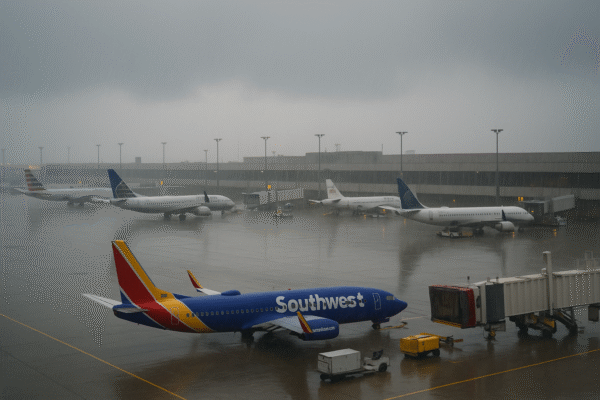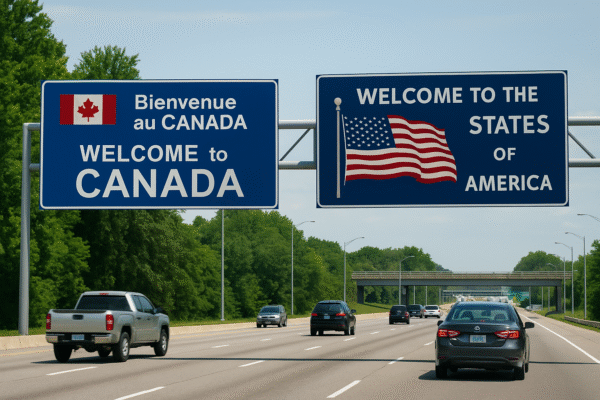Amid a sharp decline in Canadian tourism, key U.S. states—Arizona, Florida, and New York—are championing new visa policies that would allow Canadian snowbirds to stay up to 240 days per year, surpassing the current 182-day limit. The legislative proposal, known as the Canadian Snowbirds Act of 2025, is part of a broader initiative to revive regional economies and restore vital cross-border travel flows disrupted by political tensions, fluctuating exchange rates, and post-pandemic travel patterns.
Arizona: Reclaiming Its Winter Sanctuary Status
Arizona has long been a favorite winter haven for Canadian retirees, especially those from provinces like Alberta and British Columbia. However, recent data from U.S. Customs and Border Protection shows a 38.1% year-over-year drop in Canadian vehicle entries as of May 2025. Air travel has also suffered, with Canadian arrivals via flights decreasing 24.2%.
With Canadian snowbirds injecting nearly $1 billion annually into Arizona’s economy through property rentals, retail spending, and health services, the state is aggressively pursuing policy change. U.S. Senator Mark Kelly (D-AZ) stated, “Extending their stay isn’t just good for families, it’s good for Arizona’s economy, especially in areas that rely on winter tourism.”
Legislators are banking on the proposed 240-day stay allowance to reignite seasonal tourism in popular retirement and resort communities like Scottsdale, Mesa, and Tucson.
Florida: Retaining Its Crown as the Top Canadian Getaway
Florida remains a premier destination for Canadians, who represent the largest group of international visitors to the state. Yet, advance flight bookings from Canada for the April–September 2025 travel season are down by a staggering 70% compared to 2024. This drop threatens key tourism-dependent sectors across the Sunshine State.
The Canadian Snowbirds Act, co-sponsored by Senator Rick Scott (R-FL), aims to reposition Florida as a long-stay destination for retirees from Toronto, Montreal, and other Canadian cities. “This commonsense, bipartisan bill strengthens the U.S.-Canada relationship and boosts local economies,” said Scott.
Florida hopes to once again attract over 3.3 million Canadians annually, many of whom own winter homes or rent in destinations like Naples, Fort Lauderdale, and Orlando. Extended stays are expected to rejuvenate the real estate market and support industries such as golf tourism, healthcare, and home services.
New York: Inviting Canadians Back to the Empire State
From the scenic Adirondacks to the vineyards of the Finger Lakes, New York has historically been a popular seasonal retreat for Canadians, particularly from Ontario and Quebec. Yet, the state reported a 22% decline in Canadian border crossings in April 2025 and estimates a $4 billion tourism loss for New York City alone.
Tourism-dependent businesses in areas like Niagara Falls and the Thousand Islands have seen booking declines of up to 40%. To counter this, Senator Chuck Schumer (D-NY) is pushing for rapid passage of the Snowbirds Act. “Extending Canadian snowbirds’ stays will provide a much-needed boost to New York’s tourism sector, helping our local businesses thrive,” Schumer noted.
New York’s charm and proximity to Canada make it a strong candidate to capitalize on longer snowbird visits, especially among retirees seeking a quieter but culturally rich escape.
Other States Join the Snowbird Strategy
States like Texas, California, and Nevada are also eyeing similar policies. In California, cities like Palm Springs and San Diego are popular with western Canadian travelers. Texas tourism boards in regions like South Padre Island and San Antonio are crafting seasonal incentives for snowbirds. Nevada, especially Las Vegas, is creating tailored offers and discounts to win back Canadian visitors deterred by high costs and currency issues.
Ensuring Fairness and Security in Extended Stays
The proposed visa extension includes strict regulations to ensure fairness and maintain immigration system integrity. Canadian visitors under the new policy:
- Must retain Canadian residency
- Cannot work or access U.S. social benefits
- Must own or lease property in the U.S.
These measures ensure that the extended stays remain tourism-focused and economically beneficial without burdening public resources.
U.S.-Canada Relations: Strengthened Through Travel
The U.S. Department of Commerce estimates that Canadians made up over 21 million visits to the U.S. pre-pandemic, contributing over $20 billion annually to the American economy. Extending visa allowances is expected to reinforce one of the world’s most extensive bilateral tourism relationships.
This new visa policy initiative signals a shift toward long-term engagement with Canadian travelers, especially retirees who contribute consistent spending across multiple sectors. As Visit U.S. Coalition data shows, long-stay visitors often bring more economic value than short-term tourists.
Conclusion: A Blueprint for Cross-Border Tourism Growth
The Canadian Snowbirds Act of 2025 sets a precedent for future U.S. travel policies aimed at high-value, long-term visitors. With Arizona, Florida, and New York taking the lead, this legislative push is more than a temporary fix—it’s a forward-thinking strategy to stabilize regional tourism economies, deepen international ties, and enhance America’s appeal as a seasonal refuge.
As North America adjusts to new travel realities, longer stays for trusted neighbors like Canada may become a cornerstone of sustainable tourism policy—one that benefits travelers, local businesses, and diplomatic ties alike.
For more travel news like this, keep reading Global Travel Wire





















